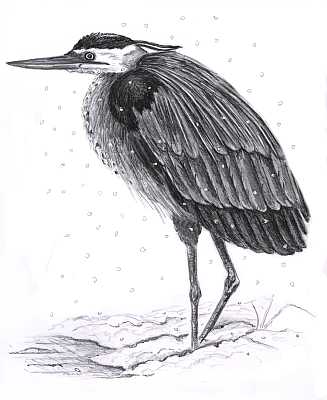
Dear Bird Folks:
I have had a Great Blue Heron feeding at a bog near my house. Now everything is frozen, yet the heron is there everyday. I’m worried. What can I do to help it?
-Olivia, Marstons Mills
Okay Olivia,
Here’s what to do. Get yourself a very long extension cord and hairdryer. If you start now, your bog should be ice free by July.
The good news is large birds like herons can last a few days without a good meal. The bad news is good meals for herons have gotten very hard to find this winter. Herons never eat their vegetables, no matter how hungry they are. They eat live creatures, mostly fish. With the endless amount of snow and ice that we’ve had this season, fish-eating birds are having a tough time.
Great Blue Herons live and breed just about anywhere in the normal United States, and most of Canada. When the cold weather arrives, the herons head south. A few come to Cape Cod where the winters usually aren’t too bad. Most of these herons are either inexperienced young birds or lost adult males too stubborn to ask for directions south. Spending the winter here has its advantages, and I’m not talking about the free off season parking in Provincetown. Herons are able to avoid the dangers of migration, plus they can be one of the earliest to arrive on the breeding grounds.
However, there is a risk with staying this far north. Yes, our winters are often mild and pleasant. Then there is this winter, the winter that never ends. Snow, ice and cold are not kind to birds and I’d bet many herons won’t be booking a visit to Cape Cod next year.
Herons have one good thing in their favor, they are excellent hunters and are total opportunists. When the fish are frozen out, they’ll eat other things including crustaceans, mice, voles and small birds. One hungry heron was seen chowing down a litter of feral kittens. I know, I know, I too was upset to read about the herons eating small birds.
Herons also have one odd behavior that is not in their favor. In the winter they seem to choose and defend a favorite fishing hole. When these areas become frozen solid, some herons don’t seem to catch on and often will stand over a frozen stream for days waiting for the fish to return. Boy, talk about stubborn.
A winter like this could hit herons hard and we could lose a lot of them. Now before you become even more obsessed with the potential loss of your heron, try to remember that these birds are predators. Many smaller creatures are happy to see them check out (remember those poor baby birds).
Years ago, when I was soft and wimpy like you, I would go out and chop holes in the ice so the herons could find fish. The herons loved me, but the fish hated me. I would get hundreds of wet and smelly letters from angry minnow widows. Other creatures hated me too. A healthy heron has few natural enemies, but a weakened heron could easily become lunch for a long list of other predators that are also struggling this winter.
Unlike the bobwhites that we talked about last week, herons are not trapped here. Soon they will leave and return to their breeding grounds. By in large, the heron population is doing fine. Great Blue Herons often nest in the dead trees created by beaver ponds. Recent changes in trapping laws have increased the beaver population and thus creating acres of potential nesting areas for herons.
Don’t be too upset about your heron, Olivia. The water should open up soon and it will be fine. If the water doesn’t open up, well…… you could always try that hairdryer option.